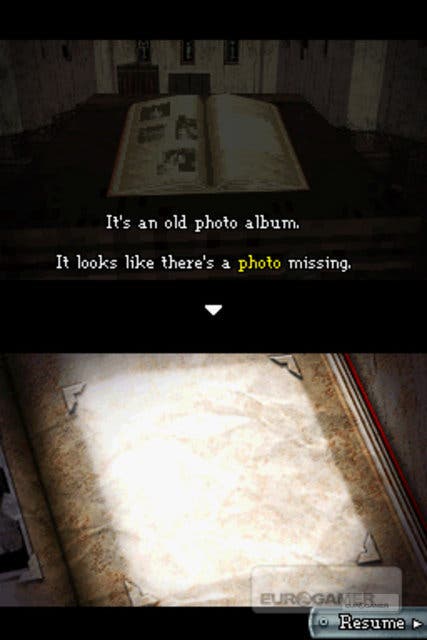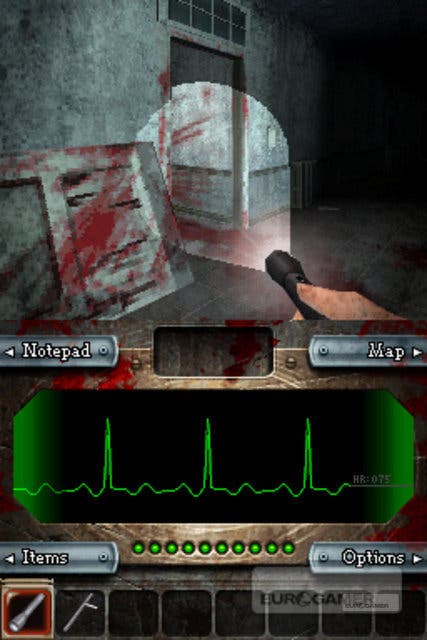Dementium: The Ward
Silent Doom.
For me, scary games need to be rancid, uncomfortable experiences that infect your dreams with sinister snatches of piano, bestial shrieks, and schlocky, slimy noises. Like all your favourite worst nightmares, they should involve trudging through an impenetrable gloom accompanied by an ever-present heartbeat thump, and never quite make sense. The fact that Dementium manages to capture all of this on a humble DS is nothing short of remarkable.
Released to largely warm acclaim in the US millions of years ago by then-newly established publishing upstart Gamecock, it was lauded for its seamless blend of Silent Hill-esque surreality with the raw, unsubtle first-person combat that made us hug Doom like a perplexed therapist.
In true horror gaming style, weirdness abounds; you find yourself waking up in a stinking, derelict hospital without too much of an idea of who you are, or why you're there. The initial similarities to Silent Hill are striking - the dreamlike ambience, the perma-darkness, the exact same mapping system, the lurching, writhing, otherworldly creatures of death, and the 'riddle-me-this' puzzles (which inevitably produce a key to get you beyond those tempting locked doors). The abandoned medical ward even appears to employ the same contract cleaners; Renegade Kid wears its influences proudly, but you'll forgive the more obvious riffs because of the skilful way they're applied.

The general idea of each of the 16 chapters in Dementium is fairly straightforward - just wander around, pick up anything not nailed down, and eventually work through to the next section of the game. On the way, you'll find a map (ooh, locked doors), solve some relatively logical puzzles (a rarity these days, admittedly) and encounter a sequence of grisly monsters trying to eat your face.
And unlike most old-school survival-horror efforts, you won't be left battling with annoying 'atmospheric' camera angles, but view the entire game from a first-person perspective. As a result, the combat feels fluid and satisfying, as you control the viewpoint mouse-style with the stylus, with the d-pad for moving/strafing, and the left shoulder button for attacking.
Initially, you'll be forced to batter slow moving zombie-like creatures which sport exposed throbbing hearts, but, sure enough, you'll also pick up a pistol and begin picking them off with ease, carefully conserving ammo where possible. As you progress, writhing, screaming giant worm beasties with vicious fangs will slither out of air vents en masse and make a beeline for you via walls and ceilings. Trying to get a bead on these rampant death leeches is tricky, and often the first you'll know about their presence is the blood-red throb of the screen to indicate you're taking damage, followed soon afterwards by the quickening pace of your heart.
Later, the game ups the ante by throwing dozens of scuttling scarab beetles after you, or flying, screaming medusa heads and cleaver-wielding maniacs. All add to the permanent danger, and sense that wherever you are, you simply want to get the hell out of there as soon as possible. Played with headphones, alone in the dark, it's genuinely unsettling. Throw in creepy piano loops, guttural groans and manic cut-scenes of a frightened girl running away (amok?) and the effect is complete.
You really don't expect this from Nintendo's cuddly handheld, and you certainly don't expect such technical feats, either. Not since Metroid Prime Hunters has a 3D game engine come along to demonstrate what a capable system the DS is when it's pushed by a determined developer.

But, as positive as all of this sounds, Dementium wasn't awash with unreserved praise when the game came out overseas. Firstly, it committed a few sins which made it a real pain in the arse to make progress, such as monsters respawning as soon as you went from one room to another, regardless of whether you had cleared it out previously. Needless to say, this had severe implications on your perilously low ammo stocks, particularly when coping with the tricky boss encounters.
An even more serious flaw was the ridiculous inability to save progress, and the game's insistence that you started from the beginning of a chapter when you died. On the lengthier levels (particularly ones culminating with a boss battle), this could mean being forced to replay half an hour's worth of painstaking progress, which in today's world of impatient gamers has to be a red-card offence. Blessed with some time to tweak the game for its European launch, both issues have been fixed, and, needless to say, make for a far less frustrating and more immersive experience.
On the other hand, by taking away this artificial padding, Dementium's somewhat brief length is exposed, as the game is simply far easier. Given the choice, though, I'd much rather it was shorter and more enjoyable than longer and a pain in the neck, so if you've held off importing it, you've perhaps done yourself a favour.
In its newly 'remastered' form, Dementium is easily one of the most interesting games to appear on the DS in some time, and certainly should have a great appeal to anyone looking for a decent horror offering. If you like to go to bed at night with the sound of abject terror ringing in your ears, look no further.


